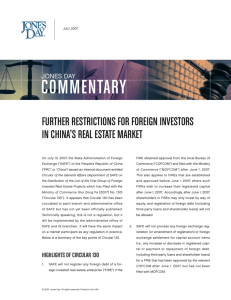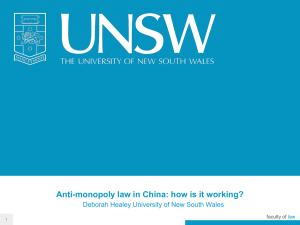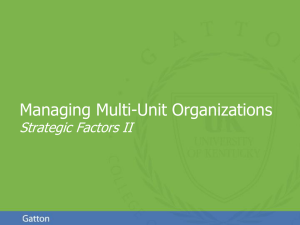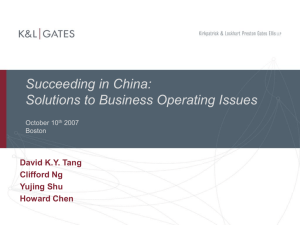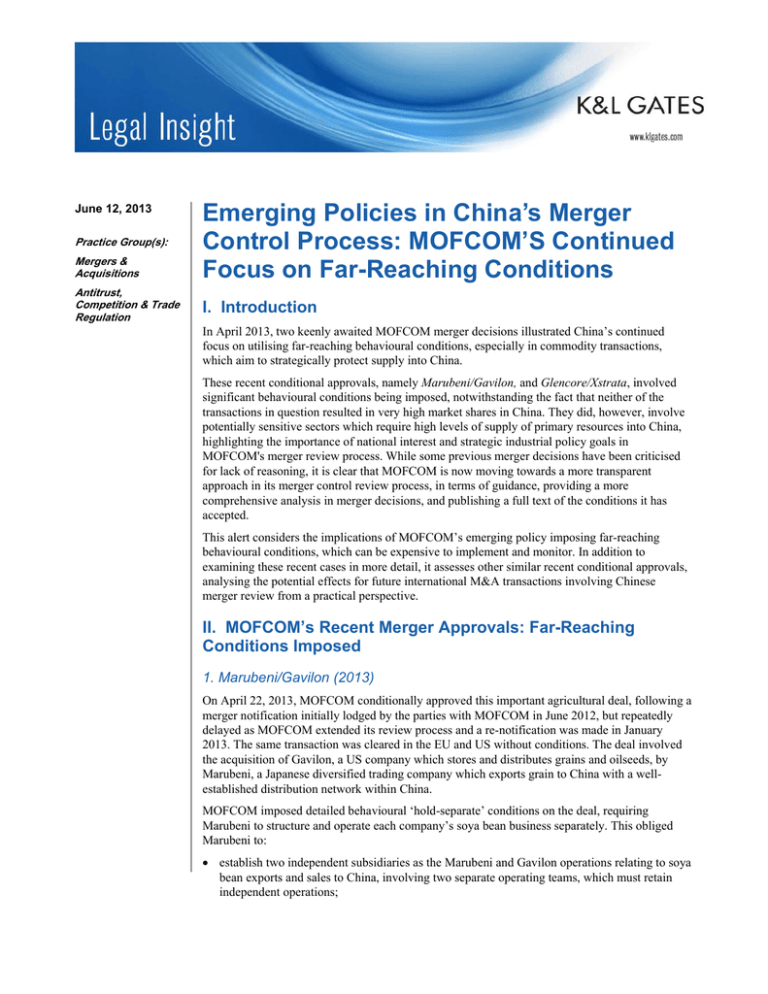
June 12, 2013
Practice Group(s):
Mergers &
Acquisitions
Antitrust,
Competition & Trade
Regulation
Emerging Policies in China’s Merger
Control Process: MOFCOM’S Continued
Focus on Far-Reaching Conditions
I. Introduction
In April 2013, two keenly awaited MOFCOM merger decisions illustrated China’s continued
focus on utilising far-reaching behavioural conditions, especially in commodity transactions,
which aim to strategically protect supply into China.
These recent conditional approvals, namely Marubeni/Gavilon, and Glencore/Xstrata, involved
significant behavioural conditions being imposed, notwithstanding the fact that neither of the
transactions in question resulted in very high market shares in China. They did, however, involve
potentially sensitive sectors which require high levels of supply of primary resources into China,
highlighting the importance of national interest and strategic industrial policy goals in
MOFCOM's merger review process. While some previous merger decisions have been criticised
for lack of reasoning, it is clear that MOFCOM is now moving towards a more transparent
approach in its merger control review process, in terms of guidance, providing a more
comprehensive analysis in merger decisions, and publishing a full text of the conditions it has
accepted.
This alert considers the implications of MOFCOM’s emerging policy imposing far-reaching
behavioural conditions, which can be expensive to implement and monitor. In addition to
examining these recent cases in more detail, it assesses other similar recent conditional approvals,
analysing the potential effects for future international M&A transactions involving Chinese
merger review from a practical perspective.
II. MOFCOM’s Recent Merger Approvals: Far-Reaching
Conditions Imposed
1. Marubeni/Gavilon (2013)
On April 22, 2013, MOFCOM conditionally approved this important agricultural deal, following a
merger notification initially lodged by the parties with MOFCOM in June 2012, but repeatedly
delayed as MOFCOM extended its review process and a re-notification was made in January
2013. The same transaction was cleared in the EU and US without conditions. The deal involved
the acquisition of Gavilon, a US company which stores and distributes grains and oilseeds, by
Marubeni, a Japanese diversified trading company which exports grain to China with a wellestablished distribution network within China.
MOFCOM imposed detailed behavioural ‘hold-separate’ conditions on the deal, requiring
Marubeni to structure and operate each company’s soya bean business separately. This obliged
Marubeni to:
establish two independent subsidiaries as the Marubeni and Gavilon operations relating to soya
bean exports and sales to China, involving two separate operating teams, which must retain
independent operations;
Emerging Policies in China’s Merger Control Process:
MOFCOM’S Continued Focus on Far-Reaching
Conditions
prohibit the exchange of competitive information between the two subsidiaries, backed up by a
mandatory firewall;
prohibit the Marubeni subsidiary’s purchase of soya beans from the Gavilon subsidiary, except
on an arm’s length basis; and
appoint a supervising trustee.
The parties may make a reasoned submission to MOFCOM to apply to have the first three
requirements withdrawn two years after MOFCOM’s decision takes effect.
MOFCOM commented that such conditions were needed, otherwise the deal would be able to
‘eliminate or limit’ competition in China’s soya bean import market. MOFCOM noted that the
supply of soya beans into China is highly dependant on imports (i.e. 80% of 2012 supplies).
However, Marubeni’s market share in the supply of soya beans to China amounted to no more
than 18% (while Gavilon’s was not specifically defined in the decision but appears to have been
around 1%), and the merged entity continued to face a number of strong international competitors
on the market. Such market characteristics would not normally present strong competition
concerns, but MOFCOM’s conditions indicate that the Marubeni/Gavilon merger was considered
to negatively affect China’s soya bean supply market, by strengthening Marubeni’s access to
global soya bean resources.
2. Glencore/Xstrata (2013)
On April 16, 2013, MOFCOM conditionally approved the Glencore/Xstrata merger after a lengthy
review process lasting around 12 months, including a re-notification. This marked the last of a
number of approvals required from international merger control agencies. The transaction
involved Glencore, the world’s biggest commodity trader, with worldwide activities in the
production and trade of a wide range of commodities and raw materials including metals and
minerals, energy products and agricultural products. The other party, Xstrata, is a natural
resources group, which is active in alloys, coal, copper, nickel and zinc. Prior to the transaction,
Glencore already held a minority equity interest in Xstrata.
In this case, MOFCOM imposed far-reaching and detailed conditions in comparison to the
approach taken by some of its international counterparts. These conditions included both
behavioural and structural requirements:
Behavioural - certain supply and pricing requirements for Chinese customers to ensure
competitive supply, for a period of eight years from January 1, 2013, such as:
o a continued offer to supply 900,000 metric tonnes of copper concentrate annually under
long-term contracts, priced on the basis of benchmark mechanisms agreed with MOFCOM;
and
o a continued offer to supply zinc concentrate and lead concentrate at ‘fair and reasonable’
rates; and
Structural - the extra-territorial divestment of Las Bambas copper mine in Peru (currently
owned by Xstrata) by September 2014, at a minimum price.
While this transaction was generally recognised as raising complex issues across a number of
jurisdictions, significant market share and other competition concerns were not so clear cut in the
Chinese market to support such far-reaching combined behavioural and extra-territorial structural
conditions. In terms of copper concentrate, the combination of Glencore and Xstrata accounted for
around only 18% supply, with a number of other strong competitors active on the market.
Consequently, the imposition of such conditions suggests a rather aggressive interpretation
2
Emerging Policies in China’s Merger Control Process:
MOFCOM’S Continued Focus on Far-Reaching
Conditions
undertaken by MOFCOM, in view of the strategic imports at issue and China’s dependency on
them.
3. Other recent MOFCOM decisions
Despite statements by MOFCOM officials in previous conferences mentioning that their decisions
in selected cases should not be interpreted as future trends, other recent MOFCOM merger
decisions indicate at least a trajectory where industrial policy goals seem to influence MOFCOM’s
merger review process.
i) Western Digital/Hitachi GST and Seagate/Samsung (2012)
The Western Digital/Hitachi GST and Seagate/Samsung mergers represented the first examples
where MOFCOM approved ‘hold-separate’ behavioural conditions, based on industrial policy
concerns, in order to protect domestic companies.
Western Digital, Hitachi GST, Seagate and Samsung, were each among the world’s five largest
manufacturers of data storage drives at the time, with products including HDDs of varying sizes
and capacities used in desktop computers, notebooks, and enterprise servers. MOFCOM approved
the two closely timed mergers, but included various hold-separate and firewall conditions. In the
case of Western Digital/Hitachi GST this involved a complex and far-reaching hold-separate
requirement to maintain Hitachi GST as an independent competitor in the global HDD market,
requiring independent manufacture, pricing and marketing. Western Digital and Hitachi GST
were also prevented from substantially altering their business models or coercing customers into
exclusively purchasing their HDDs.
MOFCOM appeared to be concerned that China has the greatest number of consumers who buy
computers and that these consumers would potentially suffer the most from increased HDD prices.
Indeed, China is also home to large numbers of manufacturers which incorporate HDDs in their
computer products. As such, the hold-separate requirements in both these cases highlight
MOFCOM’s intention to maintain the competitive status quo of the market – which was
essentially to preserve separate players in the global HDD market. MOFCOM provided for the
possibility of review of these conditions after 18 months in its Seagate/Samsung decision, and 24
months in Western Digital/Hitachi GST.
ii) Silvinit/Uralkali (2011)
The Silvinit/Uralkali decision illustrates another example of MOFCOM approving a merger with
strict behavioural conditions, involving a sensitive commodity supplied to China’s agricultural
industry, similar to Marubeni/Gavilon. The deal involved Silvinit and Uralkali, two Russian
leading potash producers in the global fertilizer industry. China is one of the largest importers of
potassium chloride worldwide (with half of China’s demand satisfied by imports). Since more
than 50% of China’s imports came from the two parties and their affiliated trade companies,
MOFCOM reasoned that the merger would create a monopoly in the supply of potash imports
through cross-border trade.
MOFCOM therefore imposed a number of behavioural conditions under its approval decision,
including requirements that the merged entity must:
maintain its established sales process and procedures when supplying potash to customers in
China, including the maintenance of direct and diligent trade and supply by rail or sea;
continue to meet the potash demands of its Chinese customers, in both volume and product
range;
3
Emerging Policies in China’s Merger Control Process:
MOFCOM’S Continued Focus on Far-Reaching
Conditions
continue to apply traditional price negotiation procedures, taking account of the
current/historical trading situation and unique features of the Chinese market; and
appoint a monitoring trustee.
MOFCOM offered explanations regarding China’s high level of dependence on imports of the
commodity, and made specific reference to Chinese importers having to purchase imports from a
single entity post-transaction. Furthermore, the strict behavioural supply, quantity and price
conditions approved by MOFCOM indicate the agency’s continued focus on safeguarding Chinese
strategic interests.
III. Practical Outcomes for M&A Transactions Requiring
MOFCOM Clearance
The above decisions illustrate MOFCOM’s increasing tendency to utilise far-reaching remedies to
clear mergers in China, where proposed deals are strategically important global transactions, and
especially involve commodities upon which China is reliant. As discussed above, MOFCOM
continues to adopt an interventionist approach to global deals despite relatively low market shares
in China. Indeed, MOFCOM recently highlighted that relatively low market shares arising from a
merger do not necessarily prevent anti-competitive effects, and similarly do not prevent
MOFCOM from imposing restrictive conditions.
Legislative Basis
Looking to the legislative basis for this approach, Chinese Anti-Monopoly Law explicitly allows
for the consideration of a transaction’s impact on China’s national economic development.
Moreover, it seems that from a procedural perspective, MOFCOM’s Anti-trust division is much
less independent than other international competition agencies, meaning that separate Chinese
ministries have a greater ability to influence the outcome of MOFCOM’s merger decisions. In
practice this means that China’s industrial policy aims and protection of access to natural
resources are given due consideration in addition to the competition analysis. However,
MOFCOM recently commented that while industrial policies may be considered, conditions
imposed are primarily driven by competition concerns (in relation to both conditional clearances
in Marubeni/Gavilon and Glencore/Xstrata).
Behavioural Conditions and Commodity Deals
An increase in the use of hold-separate conditions is emerging, in addition to the imposition of
supply and pricing requirements, in order to secure supply and pricing deals for Chinese
customers. However, as demonstrated above, the specific cases have largely involved sensitive
sectors in China, which are highly dependent on foreign companies and/or imports. It is therefore
unlikely that such far-reaching behavioural conditions would be imposed on all international
deals. What is clear, however, is that deals involving commodity markets which are strategically
important to China are likely to have to consider behavioural conditions at an early stage, even if
relatively low market shares are involved.
Increased Transparency
Until recently, MOFCOM has not been very forthcoming in terms of guidance regarding
conditions. However, as observed in K&L Gates’ recent alert on MOFCOM’s consultation on
4
Emerging Policies in China’s Merger Control Process:
MOFCOM’S Continued Focus on Far-Reaching
Conditions
proposed Guidance on Conditions,1 it is welcomed that MOFCOM appears to be taking an
increasingly sophisticated and transparent approach in its merger control review process,
providing more insight on the practice and processes for parties who wish to propose both
structural and behavioural conditions. The same can also be said in relation to its increasingly
detailed merger decisions, such as Glencore/Xstrata, which included a detailed explanation of the
conditions. This offers a valuable insight into MOFCOM’s analysis and its due consideration of
conditions in practice for future merging parties.
Early Contact With MOFCOM
Finally, as noted, MOFCOM conditionally cleared a number of the above mergers following a
lengthy review, and in some cases this even required the parties to re-submit their merger
application. This illustrates the importance of undertaking contacts with MOFCOM at an early
stage of a notifiable transaction, especially where it involves the supply of key commodities in
China. Conditions may well be required to be negotiated in order to get the transaction past
MOFCOM, even where other anti-trust agencies have already cleared the same deal without issue.
Such a process can take time, and merger parties should factor this into their transaction timetable.
Authors:
Yujing Shu
Neil Baylis
yujing.shu@klgates.com
+86.10.5817.6100
neil.baylis@klgates.com
+44.(0)20.7360.8140
Siobhan Kahmann
Hai-Ching Yang
siobhan.kahmann@klgates.com
+32.(0)2.336.1910
hai-ching.yang@klgates.com
+86.10.5817.6102
Anchorage Austin Beijing Berlin Boston Brisbane Brussels Charleston Charlotte Chicago Dallas Doha Dubai Fort Worth Frankfurt
Harrisburg Hong Kong Houston London Los Angeles Melbourne Miami Milan Moscow Newark New York Orange County Palo Alto
Paris Perth Pittsburgh Portland Raleigh Research Triangle Park San Diego San Francisco São Paulo Seattle Seoul Shanghai
Singapore Spokane Sydney Taipei Tokyo Warsaw Washington, D.C. Wilmington
K&L Gates practices out of 48 fully integrated offices located in the United States, Asia, Australia, Europe, the
Middle East and South America and represents leading global corporations, growth and middle-market
companies, capital markets participants and entrepreneurs in every major industry group as well as public
sector entities, educational institutions, philanthropic organizations and individuals. For more information
about K&L Gates or its locations, practices and registrations, visit www.klgates.com.
This publication is for informational purposes and does not contain or convey legal advice. The information herein should not be used or relied upon
in regard to any particular facts or circumstances without first consulting a lawyer.
©2013 K&L Gates LLP. All Rights Reserved.
1 For more information on MOFCOM’s recent consultation on its proposed guidance on conditions, namely ‘Provisions on the Additional
Restrictive Conditions for the Concentrations of Undertakings – Draft for Comments’, please refer to K&L Gates Alert at
http://www.klgates.com/mofcom-opens-public-consultation-on-detailed-merger-remedies-proposals-04-18-2013/ .
5

